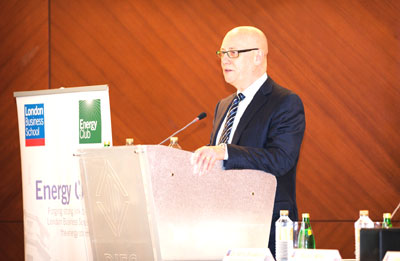
US shale gas revolution 'good news for ME'
Dubai, June 2, 2013
The impact of America’s shale gas ‘revolution’ is good news for the oil-rich, gas-short Middle East, said experts at the London Business School’s Energy Insights Forum.
Energy Insights is the latest in a series of thought-leadership forums organised by London Business School at its regional headquarters in Dubai International Financial Centre.
The US is fast becoming energy self-sufficient through shale gas and looks set to become a major net exporter of natural gas within the next decade. While the American abundance of natural gas may be seen by some as a threat, it also presents opportunities for Middle East talent in the energy sector, said the experts.
In the US, shale gas is dramatically boosting economic development, adding an estimated $300 billion to US GDP by increasing employment opportunities and reviving its manufacturing industry. Recruitment experts now predict a talent exchange between the Middle East and the US.
“The region will become an exporter of talent,” remarked Danny Leinders, senior client partner, Korn Ferry International. “We will now move talent from the region into North America as the demand for energy expertise grows over there,” he stated.
Recruitment experts also pointed out that energy companies will place increasing importance on talent with a specialism in certain departments. “We’ll also see much stronger demands on departments such as health and safety, and corporate communications,” he added.
As the regional energy mix diversifies, there are other benefits for Middle East talent too. The increasing focus on the renewables sector is good news because of regional job creation and opportunity.
“The push in renewable energy in Abu Dhabi and Saudi Arabia in particular has seen the formation of entirely new organisations. This presents new job roles for both locals and expats,” said Danny.
As the global pattern of energy supply and demand shifts as a result of US shale gas, experts at the forum also noted that the Middle East now has the opportunity to reassess its own energy policy.
Speaking at the forum, Dr Harry Bradbury, the chairman of Five Quarter Energy, said, "The Middle East should first address what is happening locally before fretting about America. Middle East players should consider what routes they can take to guarantee gas supply."
"There is a need for greater manufacturing opportunities here, and technology, which is an enabler," he observed.
“Without intervention, domestic energy demand will likely double over the next decade,” said Eduardo van-Zeller Neto, the principal at Boston Consulting Group.
“The challenge is not concerned with price pressure from new global supply routes, but with the efficient use of hydrocarbons in the GCC. A larger availability of gas will contribute to a more efficient use of hydrocarbons in the region,” he added.
Robin Mills, the head of Consulting at Manaar Energy Consulting and Project Management, said, “It is high time for the region to set the correct commercial incentives for private-sector and international investment into gas – and that includes the right pricing.”
Mounir Bouaziz, the VP for Upstream International Commercial Mena at Shell, said, "Ultimately, whilst the reserves are big, there is a regional gas shortage of 50 billion cu m per year. Global gas abundance in the world is good news for the Middle East. LNG is the fastest and most flexible way of linking the resource base to big demand centres.”
The experts were speaking to an audience of students enrolled on London Business School’s Executive MBA programme, together with alumni, recruiters and partners.
The panel discussion was moderated by Eithne Treanor, Founder of ETreanor Media.-TradeArabia News Service







